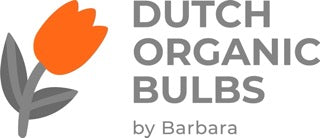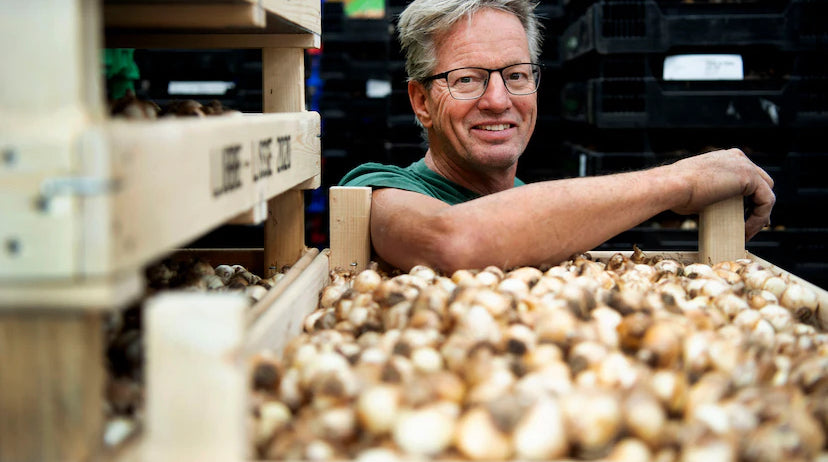 Organic bulb grower John Huiberts: ‘It’s a leap into the unknown. And not everyone dares to take the plunge.’
Organic bulb grower John Huiberts: ‘It’s a leap into the unknown. And not everyone dares to take the plunge.’
Picture by Olaf Kraak
John Huiberts is the Willie Wortel (Gyro Gearloose) of organic bulbs: ‘My brain never stops’
The Netherlands is the world champion in flower exports, but there is hardly any organic cultivation. John and Johanna Huiberts do have organic flowers in the field. ‘Young people want to do things differently, more sustainably. That gives me hope.’
Report by Leon Zantinge for the Dutch newspaper Trouw, 30 June 2025, 12:05
In Sint Maartensbrug, a small village in the north of North Holland, is the farm of John (63) and Johanna (62) Huiberts. With 111 acres of land, it is by far the largest organic flower bulb farm in the Netherlands.
In addition to Huiberts, there are six smaller organic growers in the Netherlands. Of the 70,000 acres of flower bulb fields, only 160 acres are pesticide-free, says Huiberts. More than 99 percent of the bulb sector uses chemical pesticides. Nevertheless, the Huiberts are convinced that it is possible: growing organic flower bulbs. Although they are the first to admit that it is not made easy for them.
At the driveway in front of the farm is a brand new tractor with special mechanical cutting machines, to remove weeds above the crop. Completely designed by John Huiberts and built by his partner Glenn Vaars (37). “Thanks to this tractor, I do not have to use pesticides against weeds, great, isn't it?”
While he is walking on his land, it starts to rain softly. Drops tap on the leaves of the flowers, and the smell of wet earth mixes with that of fresh green. Huiberts crouches, uses his shovel to lift a bulb out of the ground and turns it between his fingers, as if he is looking at a treasure. “Look at that,” he says. The harvest season is coming – he can't wait.
Nature is the loser
Organic farming, says Huiberts, requires a change of mindset. He worked with pesticides for most of his career. Fifteen years ago, he switched to organic farming and now he works completely differently. “Not fighting against nature, but working with nature. In a fight, there is always a loser, in this case nature.”
His turnaround came in 2010, during a soil biology course. “There I learned, among other things, that there are no more fungi in our soil. They disappear due to the use of pesticides. Even the good fungi.” And those are precisely what are very much needed to make plants grow, says the bulb farmer.
“Without the use of chemical pesticides, it is a completely different way of working. I do not look at how I can combat a pest, but at what causes that pest. There are often natural shortcomings, such as the lack of fungi.”
Huiberts constantly looks at what nature has to offer and makes use of that. “I have a number of fields with beans that extract nitrogen from the air and bind it in the soil. That makes the soil more fertile for the flower bulbs. My brain never stops. I am constantly thinking about new methods, tricks or devices.”
Organic farming is the future, just like electric driving is.
Thanks to laser technology – burning weeds with a laser beam without damaging the crop –, mechanical weed killers and other detours, he can grow without poison. It earned him the nickname ‘Willy Wortel (Gyro Gearloose) of the organic bulbs’.
He chuckles when that name is mentioned, and then immediately continues talking about his work, which he firmly believes in. “Organic cultivation is the future, just like electric driving is. But we can’t all suddenly be forced to drive electric, because then car manufacturers won’t be able to meet the demand. And besides, what do you do with all the petrol cars? These kinds of things take time.”
Dutch growers produce billions of flower bulbs every year, mainly intended for export to all corners of the world. Although only 1.25 percent of agricultural land is used for flower bulbs, the bulb sector accounted for 21 percent of national pesticide use in 2020.
Hessel Bierma is secretary of the Dutch growers’ association of organic flower bulb growers, Biobol. He attributes the small number of organic bulb growers to ‘a fear of cold water’: “Many growers want to, but don’t dare. They are afraid that they will lose sales, or that the yield from organic farming is too low.” A major hurdle is the three years that a grower has to bridge before he is organic. This time is needed to clean the soil of chemical agents. During this period, the farmer does not yet receive the higher price for his organic products, because the official label is missing.
Organic farmer Huiberts: “Three years seems short, but during this transition period you are no longer allowed to use any chemical pesticides. It is a leap into the unknown. And not everyone dares to take the plunge.” The fact that most bulb growers stick to the current system is therefore not necessarily out of unwillingness, but out of uncertainty, he says. Organic cultivation requires different knowledge, different machines, and above all: a different mindset.
 Picture: Sorting bulbs at the company in Sint Maartensvlotbrug. By Olaf Kraak
Picture: Sorting bulbs at the company in Sint Maartensvlotbrug. By Olaf Kraak
Bierma of Stichting Biobol thinks that the fear of cold water among growers can decrease if the government helps. “If the government really wants to encourage organic farming, and it says it does, then there should be many more regulations to help growers with that transition and to make it fiscally attractive. For example, with specific subsidies for the switch to organic.”
Hardly any choices
Huiberts does see something shifting, also among consumers. When the news broke in October 2024 that a French girl had died of leukemia – as a result of pesticides that her mother, as a florist, ingested via cut flowers – the demand for his organic bulbs increased significantly.
“The number of people who want to buy a bunch of flowers without chemicals is growing. When people are given the choice, they often choose organic. But that choice is hardly there now,” says Huiberts. The Biobol association sees a key role for retailers. “As long as they do not buy organic flowers, the market will remain small. And as long as the market remains small, growers will remain cautious. It is a chicken and egg story.”
Florists' association VBW says that the demand for organic flowers is limited, ‘but growing’. Organic flowers are therefore only available for a limited part of the year and in limited quantities, the VBW notes.
Huiberts tries to encourage fellow growers to make the switch to organic, or at least to learn from organic cultivation by working less with chemical agents. He does not keep his knowledge to himself. This afternoon he receives various fellow growers on his farm, gives tours and shares his experiences with mechanical weed control and natural cultivation. The scoop today is the newly designed machine on the tractor.
Independent of Bayer
It fits in with the philosophy of his company: he does not see colleagues as competitors, but as allies in the transition to cleaner agriculture. "If I can help to make them less dependent on chemicals, then I am happy to do so," he says. "I want all other growers to have a bit of fun too. It is so much fun to be independent of companies like Bayer and those kinds of jokers. Bayer really does not make those agents for farmers, but to have a revenue model itself." Huiberts and his wife will soon be officially retiring. They have already found new owners for their farm. There are three of them, they come from outside the family and will form a cooperative. Glenn Vaars is one of them: “We are aware that things have to change. Organic farming is the future. If we want to be on earth for the next thousand years, the most natural way is the only way.”
According to Huiberts, that says something about the next generation. “You see that young people consciously choose this way of farming. They want to do it differently, more sustainably. That gives me hope.” Huiberts will remain involved with the company in the coming years to teach his successors the tricks of organic farming.
But will he really retire after that? Not for the time being: he will support companies in their transition to organic or to become less dependent on chemicals. “The soil is there,” says Huiberts, “now we just have to sow.”

